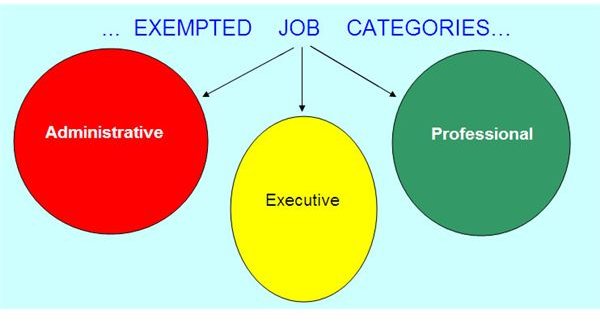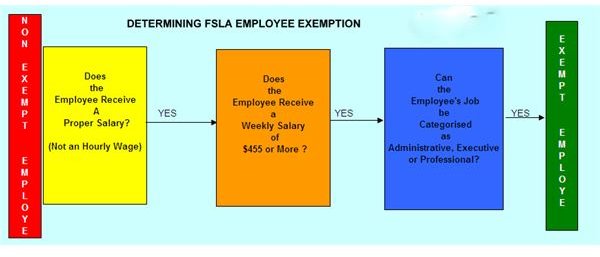Determining Who Are FLSA Exempt Employees
FLSA – Fair Labor Standards Act lays down the wage and hour statutes that govern most jobs in the United States. The excluded jobs comprise – either jobs that have been specifically marked for exclusion as per the provisions of this act, or jobs which are governed by the statutes of some other federal labor law. The guidelines provided in this article will make it easier to identify FLSA exempt employees.
FLSA Exempt Employees and Non-Exempt Employees
FLSA requires that every employer establish the exemption status for each and every job position in the organization, as and when these job positions are created. All employees must be classified under one of the two categories – ‘exempt’ or ‘non-exempt’. The basic difference between exempt and non-exempt employees is whether or not they are entitled to be paid for overtime work hours.
Most employees working in operational and production departments who perform routine functions fall under the non-exempt category, and must be paid for overtime work. In general, overtime implies time spent working beyond the regular 40 hours in a particular workweek. However, this definition of overtime is flexible enough to accommodate the weekly work hours as mentioned in the job contract bargained at the time of the employee’s appointment.
On the other hand, the FLSA exempt employees who cannot claim any monetary compensation for working overtime are generally from one of the three work categories – executive, administrative or professional. A broader definition of FLSA exempt employees, awards those employees with the ‘exempt’ status whose duties involve exercising discretion and taking independent decisions in the regular course of performing their duties.
Basic Criteria for FLSA Employee Exemption
An employee can be awarded FLSA exempt employee status only if his job position satisfies three basic criteria.
1. Salary Amount: In order to be classified as exempt, an employee must earn $455 or more per week. This weekly earning criterion remains unaffected by whether an employee is working full time or part time.
2. Compensation Type: The second criterion to be satisfied for employee FLSA exemption is that the employee receives a proper salary for his work and is not paid on an hourly basis. If an employee is working on an hourly basis, his weekly earnings will fluctuate with the number of hours that he works in a given week. This will make it easier to classify an employee as exempt or non-exempt, based on his salary amount. To be considered for exemption, it is important that an employee has a consistent weekly salary, irrespective of the number of work hours put in.
3. Job Categories: The nature of work performed and the type of duties associated with a job position are the next important factors that need to be regarded when deciding on exempt and non-exempt status for employees. Since, this FLSA employee exemption criterion is more complex and elaborate; it has been explained in detail in the next section.
Screenshot Taken By - Sidharth Thakur
FLSA exempt Status Requirements for Different Job Categories
When analyzing job positions for paid overtime exemptions as per FLSA, the job titles do not hold much relevance. The employer must focus on the tasks, duties and responsibilities associated with each job position, to evaluate whether a particular job position can be classified as exempt or non-exempt. There are three types of job duties that qualify for overtime exemption.

Screenshot Taken By- Sidharth Thakur
FLSA Administrative Exemptions
Employees performing non-manual office work, in job capacities that allow them to make choices and take independent decisions qualify for FLSA administrative exemptions. By and large, this category would include employees performing management and general business administration functions, like human resource, finance, customer service, sales and marketing. Such job positions have a supportive role in the organization, and are in no way directly related with the production of the product or services that the business sells. In the management jargon such employees are often referred to as staff employees, whilst the people involved with production are referred to as line employees.
Executive Exemptions
This exemptions category comprises employees who are into management or supervision of departments or subdivisions. As with all job category FLSA exemptions, employees in these job profiles too exercise a good amount of discretion and make independent decisions in the course of their day to day work. To qualify for an executive exemption three criteria need to be satisfied – the employee
- must have independent decision making powers,
- performs some management functions and is not merely into supervising and
- supervises two or more ‘Full-Time Employees’ and is in a capacity to make decisions related to their employment.
Here are some of the typical management duties that can qualify for FLSA exempt employees, as per Fair Labor Standards Act regulations.
- Employee related functions like interviewing, training, handling grievances, disciplining, monitoring performance and productivity appraisals.
- Finance related functions like budgeting, book keeping, maintaining records, and setting pay rates.
- Operations related functions like planning, apportioning work, devising work techniques and complying with the regulatory framework.
FLSA Professional Exemption
Job positions that require employees with some kind of an advanced degree to perform the core duties of that job also qualify for FLSA professional exemption. The other prerequisite is that the employee does work that is original, unique, intellectual or creative. In general, employees who are learned professionals such as doctors, lawyers, architects or teachers, can be put under the exempt category. The simplest way to determine professionally exempt job positions is fairly easy – the employer just needs to look at the specialized education or advanced degrees that an employee must have to perform the core duties. Conversely, if no specific education is required to perform the duties, the job can be classified as non-exempt.
Continue to the next page to see whether FLSA employee exemptions apply to computer professionals.
FLSA Employees Exemption for Computer Professionals
While employers are easily able to classify most employees as exempt and non-exempt, there’s still confusion about how FLSA exemptions work for computer professionals. It’s because computer professionals may be eligible for the paid overtime exemption, even though they may be involved in the development (production) of the software that the business sells.
Besides satisfying the type of compensation and weekly salary conditions, here are a few more things that must be taken into account at the time of deciding the exemption status for computer professionals.
1. An employee who is a skilled computer professional and is employed as a programmer, systems analyst, software engineer or something similar can be considered for exemption.
2. The core duties of the employees must fall into one of the three categories, or the duties can be a combination of or duties requiring equivalent level of skills:
• Using system analysis techniques for problem solving or development of new software. This may include discussing and determining functional specifications from users or clients.
• Designing, developing, analyzing, testing and modifying computer programs or even prototypes, in accordance with user or system specifications.
• Designing, developing, documenting, creating, testing or customizing programs to suit the specific requirements of a client or an operating system.
Manage FLSA Employee Exemptions with Absolute Care
The government agencies who administer the compliance of FLSA look primarily at the job role performed by the employee and the salary structure. Thus it becomes important for the employer to ensure that the employee is actually complying with the job duties as specified for the job position, since any disagreement here can make even the exempt employees to be eligible for non-exempt paid overtime. For instance, an engineer, hired as a technical specialist, does nothing but minor electrical repairs will be considered a non-exempt employee, even though he should be exempted because of his designation and his specialized degrees.
The employer must classify each job position as exempt or non-exempt, once the tasks to be performed have been clearly determined for the job position. At the same time, it is of equal importance to periodically audit the job position and the employee’s role to ensure that the duties haven’t changed to an extent that the FLSA exempt employees should now be treated as non-exempt.
